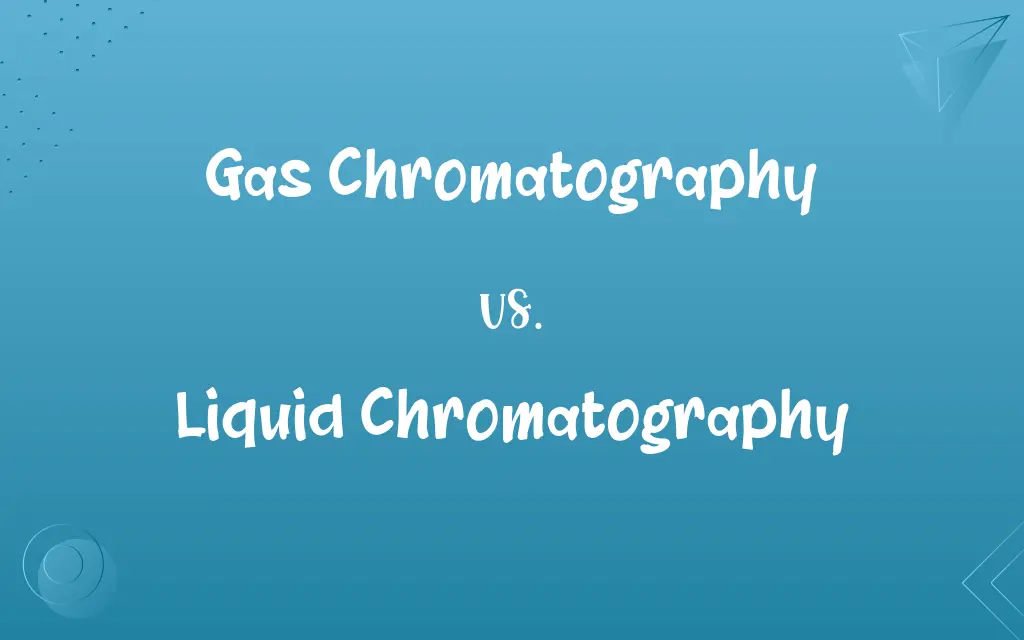Gas Chromatography vs. Liquid Chromatography: Know the Difference

By Shumaila Saeed || Published on January 25, 2024
Gas Chromatography (GC) separates mixtures based on gas phase interactions; Liquid Chromatography (LC) does so in a liquid phase.

Key Differences
Gas Chromatography (GC) involves vaporizing samples and passing them through a column with a gas mobile phase, while Liquid Chromatography (LC) uses a liquid mobile phase to separate compounds in a mixture. Both techniques are used for separating and analyzing compounds, but GC requires volatile and thermally stable samples, whereas LC is suitable for a wider range of substances, including those that are non-volatile.
Shumaila Saeed
Jan 25, 2024
In Gas Chromatography, the separation of compounds is based on their distribution between a stationary phase and a gaseous mobile phase. Liquid Chromatography, on the other hand, involves the separation of compounds based on their distribution between a liquid mobile phase and a stationary phase. GC is highly effective for gases and small, volatile organic molecules, while LC is used for larger, non-volatile molecules, including biomolecules.
Shumaila Saeed
Jan 25, 2024
Gas Chromatography is known for its high resolution and sensitivity, particularly in analyzing small organic molecules. Liquid Chromatography, in contrast, is versatile in handling a variety of sample types, including large biomolecules like proteins. GC often uses a flame ionization detector or a mass spectrometer for detection, while LC typically employs UV-visible spectrophotometry or mass spectrometry.
Shumaila Saeed
Jan 25, 2024
In terms of operational conditions, Gas Chromatography requires control of temperature as a critical parameter. Liquid Chromatography, however, relies more on the control of solvent composition and flow rate. GC is more suited to analysis of compounds with low boiling points, whereas LC is preferred for thermally labile or high molecular weight compounds.
Shumaila Saeed
Jan 25, 2024
The choice between Gas Chromatography and Liquid Chromatography depends on the nature of the sample and the analytical requirements. GC is ideal for analyzing volatile organic compounds, whereas LC is the method of choice for large, non-volatile compounds, including many pharmaceuticals and biological samples.
Shumaila Saeed
Jan 25, 2024
ADVERTISEMENT
Gas Chromatography and Liquid Chromatography Definitions
Gas Chromatography
GC operates based on the differential partitioning of compounds between a gas phase and a stationary phase.
The forensic lab employed gas chromatography for toxicology screening.
Shumaila Saeed
Jan 10, 2024
Liquid Chromatography
Liquid Chromatography is a technique for separating compounds in a liquid phase.
Liquid chromatography was used to purify proteins from a complex mixture.
Shumaila Saeed
Jan 10, 2024
Gas Chromatography
Gas Chromatography is a method for separating and analyzing compounds in a gas phase.
The laboratory used gas chromatography to analyze the air samples.
Shumaila Saeed
Jan 10, 2024
Liquid Chromatography
LC separates substances based on their distribution between a liquid mobile phase and a stationary phase.
Pharmaceutical compounds were analyzed using liquid chromatography.
Shumaila Saeed
Jan 10, 2024
Gas Chromatography
GC is a technique where volatile compounds are separated based on their distribution between a stationary phase and a gas mobile phase.
Perfume fragrances were identified using gas chromatography.
Shumaila Saeed
Jan 10, 2024
ADVERTISEMENT
Liquid Chromatography
In LC, a variety of solvents are used as the mobile phase for separating complex mixtures.
Natural plant extracts were separated into their components via liquid chromatography.
Shumaila Saeed
Jan 10, 2024
Gas Chromatography
GC is used for the analysis of volatile organic compounds.
Gas chromatography was instrumental in analyzing the chemical composition of essential oils.
Shumaila Saeed
Jan 10, 2024
Liquid Chromatography
LC is effective for analyzing large or non-volatile molecules.
Biological samples were routinely examined using liquid chromatography.
Shumaila Saeed
Jan 10, 2024
Gas Chromatography
In GC, substances are vaporized and carried by an inert gas through a column for separation.
Environmental pollutants were quantified through gas chromatography.
Shumaila Saeed
Jan 10, 2024
Liquid Chromatography
LC employs different modes like reverse phase, ion exchange, and size exclusion for separation.
Amino acids in a sample were separated by reverse phase liquid chromatography.
Shumaila Saeed
Jan 10, 2024
ADVERTISEMENT
Repeatedly Asked Queries
How does Gas Chromatography work?
In GC, substances are vaporized and carried by a gas through a column where they are separated.
Shumaila Saeed
Jan 25, 2024
How does Liquid Chromatography work?
LC separates compounds based on their interaction with a liquid mobile phase and a stationary phase.
Shumaila Saeed
Jan 25, 2024
What types of samples are analyzed using Gas Chromatography?
GC is suitable for volatile, thermally stable compounds.
Shumaila Saeed
Jan 25, 2024
What is Gas Chromatography?
GC is a technique for separating volatile compounds in a gas phase.
Shumaila Saeed
Jan 25, 2024
Can Gas Chromatography analyze non-volatile compounds?
No, GC is not suitable for non-volatile compounds.
Shumaila Saeed
Jan 25, 2024
What is Liquid Chromatography?
LC is a method for separating compounds in a liquid phase.
Shumaila Saeed
Jan 25, 2024
Can Liquid Chromatography analyze volatile compounds?
Yes, but LC is more versatile and can also analyze non-volatile compounds.
Shumaila Saeed
Jan 25, 2024
What is the mobile phase in Liquid Chromatography?
LC uses a liquid mobile phase, which can be water or various organic solvents.
Shumaila Saeed
Jan 25, 2024
What types of samples are analyzed using Liquid Chromatography?
LC is used for a wide range, including large, non-volatile compounds.
Shumaila Saeed
Jan 25, 2024
Is temperature control important in Liquid Chromatography?
LC is less sensitive to temperature variations.
Shumaila Saeed
Jan 25, 2024
What are common detectors in Gas Chromatography?
Common detectors include flame ionization and mass spectrometry.
Shumaila Saeed
Jan 25, 2024
Is Liquid Chromatography suitable for biomolecules?
Yes, LC is well-suited for separating large biomolecules.
Shumaila Saeed
Jan 25, 2024
What are the limitations of Gas Chromatography?
GC cannot analyze high molecular weight or thermally labile compounds.
Shumaila Saeed
Jan 25, 2024
What are common detectors in Liquid Chromatography?
LC often uses UV-visible spectrophotometry and mass spectrometry.
Shumaila Saeed
Jan 25, 2024
What is the mobile phase in Gas Chromatography?
The mobile phase in GC is an inert gas like helium or nitrogen.
Shumaila Saeed
Jan 25, 2024
What industries use Liquid Chromatography?
LC is widely used in pharmaceutical, biotechnology, and environmental industries.
Shumaila Saeed
Jan 25, 2024
What are the limitations of Liquid Chromatography?
LC is generally more versatile, but can be less sensitive than GC for certain analyses.
Shumaila Saeed
Jan 25, 2024
What industries use Gas Chromatography?
Industries like environmental, pharmaceutical, and chemical analysis use GC.
Shumaila Saeed
Jan 25, 2024
Is temperature control important in Gas Chromatography?
Yes, temperature control is critical in GC.
Shumaila Saeed
Jan 25, 2024
Can Gas Chromatography separate biomolecules?
GC is less suited for large biomolecules, which are typically non-volatile.
Shumaila Saeed
Jan 25, 2024
Share this page
Link for your blog / website
HTML
Link to share via messenger
About Author
Written by
Shumaila SaeedShumaila Saeed, an expert content creator with 6 years of experience, specializes in distilling complex topics into easily digestible comparisons, shining a light on the nuances that both inform and educate readers with clarity and accuracy.








































































